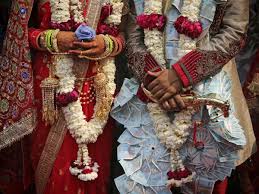Court marriage in Rishikesh is a ceremony of love and faith that brings families closer together and strengthens the bonds of family. The Special Marriage Act, 1954, is a legal provision which provides for marriages between an Indian citizen and a foreign woman who belong to a different country. Court marriage is also commonly done between an Indian man and a woman of any religion or faith, regardless of their caste, faith or creed. The parties involved in this wedding ceremony have to be of sound mind, both physically and mentally, or suffering from some mental disorder for which marriage is a religious requirement in many cultures. Rishikesh is a peaceful city, and there are many options for Court marriages. A Rishikesh matrimonial lawyer who has knowledge about various legal procedures will guide the couple well. It is customary for an Indian bride to take her family members along with her on her marriage day so that she may be accompanied by them in her official wedding ceremonies. If you have both decided to get married in Rishikesh under the Special Marriage Schedule, your relatives cannot come along. However, the bride and the groom can choose to get their marriage solemnized elsewhere in Rishikesh. Before the marriage takes place, a session of preliminary negotiations takes place in which the parties along with the judge try to iron out all the nitty-gritties related to the contract. In this session, the judge reads out loud the documents required by the two parties, after which the judge reads out the final judgment. The court marriage in Rishikesh formalizes when the judge accepts the written documents presented by both the parties. Nowadays, both the bride and the groom have to present original birth certificates, and valid Passports before the marriage gets solemnized in the Rishikesh. The bride and the groom have to present the necessary documents required by the court. After these documents are presented, the two parties are legally registered as husband and wife in the civil registry office of the town hall in Rishikesh. The best court marriage in Rishikesh takes place when the two parties reach the venue a few hours after being pronounced husband and wife, by the authorised officers of the civil registry
court marriage is the Arya Samaj marriage in a civil court without the permission of the priest. There are two types of marriage in court which are judicial and sacred. Judicial marriage in court can be legalized by a judge by just signing the papers and making the required submission to the court. Then a document of marriage will be produced by the bride and the groom and it will get certified by a judge and it will get approved by the priest and it will get legal and solemnized by the court by getting the approval of the priest.
Court Marriage is a common procedure, which has to be followed by everyone. If a marriage is not registered it is not considered valid during legal procedures such as, applying for a joint home loan. You could also be fined for not registering your marriage. It is a rule that all the marriages have to be registered whether you are having a wedding ceremony or not.
A marriage certificate is an important proof, in case there are some problems between you and your spouse in the future and a legal action needs to be taken.
Advantages of Court Marriage Certificate:-
• Certificate of Marriage is a document, which provides valuable evidence of marriage;
• Certificate of Marriage is a document providing social security, self-confidence particularly among married Women.
• Court Marriage Certificate is useful in getting the visa for the wife/husband.
• It will be helpful in claiming the Bank deposits or Life Insurance benefits when the depositee or the Insurer dies without a nomination or otherwise.
Documents required for the Performance & Registration of Court Marriage
1. Passport Size Photographs – four each of Marrying Persons.
2. Residential Proof (Voter Card / Passport / Ration Car / Driving License / Bank Passbook / Lease Deed / Rent Deed) of Marrying Persons.
3. Date of Birth Proof (Municipal Corporation Certificate, X th or XII th Examination Certificate, Passport, PAN Card) of Marrying Persons.
4. If any party is divorcee Certified copy of Decree of Divorce granted by the Court.
5. If any party is widow / widower Death Certificate of the dead spouse.
6. If any party is a Foreign Citizen or holding a foreign Passport or is having foreign residential address – Certificate of Present Marital Status of the party / No Impediment Certificate / NOC from concerned Embassy and Valid VISA.
7. Two Witnesses (Both should be major)



